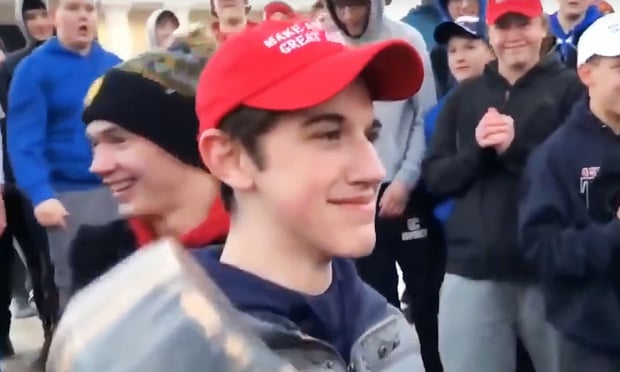Judge in CNN, Washington Post Libel Case Is No Stranger to Free Speech Fights
Senior Judge William O. Bertelsman of the U.S. District Court for the Eastern District of Kentucky, who was appointed by President Jimmy Carter, is overseeing the defamation lawsuits filed by a Kentucky teenager.
April 11, 2019 at 06:55 PM
6 minute read
 Nicholas Sandmann (Photo via YouTube)
Nicholas Sandmann (Photo via YouTube)
The Kentucky judge overseeing separate multimillion-dollar defamation lawsuits by a teen whose photographed face-off with a Native American in Washington went viral in January is no stranger to high-profile free speech fights.
A defamation case by a former Cincinnati Bengals cheerleader prompted Senior Judge William O. Bertelsman of the U.S. District Court for the Eastern District of Kentucky to strip an online website of immunity for libelous third-party commentary in 2011. Six years later, he gutted a Kentucky ethics law on First Amendment grounds in a case that is still on appeal.
Born in 1936, Bertelsman was nominated to a newly created federal judgeship in Kentucky's Eastern District in 1979 by President Jimmy Carter. He has been a senior judge for 18 years.
Two defamation suits—one against The Washington Post and a second against CNN—have landed in Bertelsman's courtroom after Kentucky teenager Nicholas Sandmann's visage as he faced down a Native American marcher at the National Mall sparked an angry Twitter backlash in January.
Stories from The Washington Post, CNN and multiple other media outlets stemmed from that viral photo of Sandmann, who was wearing a red Make America Great Again hat, standing face-to-face with Nathan Phillips, who was participating in the Indigenous People's March.
Atlanta libel attorney Lin Wood filed the suits on behalf of Sandmann, who was attending the annual Right to Life March in Washington, D.C., with other students from Covington Catholic High School in Kentucky.
Wood and co-counsel Todd McMurtry at Kentucky firm Hemmer DeFrank Wessels sued CNN for $275 million, and the Post for $250 million, claiming their reporting of the encounter defamed Sandmann.
Sandmann's lawsuits claim that stories about the encounter included interviews with Phillips that were false, defamatory and indicative of malice on the part of the news outlets. But the lawsuits also include political attacks on CNN and the Post for an alleged bias against President Donald Trump that Wood claimed spurred negative coverage of Sandmann.
Wood said, “Any contention that Nicholas Sandmann's defamation lawsuit is politically motivated is errant nonsense.”
But he also contends that what he branded as “the bias of the Post” against Trump “is a provable fact that is relevant to the litigation.”
Bertelsman presided over a defamation case filed in 2009 by Cincinnati Bengals cheerleader Sarah Jones against website operator Dirty World Entertainment Recordings over sexually explicit posts that a third party made about her. CNN and Twitter were among the news outlets, publishers and social media giants that filed amicus briefs on Dirty World's behalf.
Bertelsman determined the defendants were not shielded by the Communications Decency Act of 1996, which holds that website operators are neutral platforms that cannot be viewed as publishers of third-party content. The law has allowed companies or individuals operating online websites to argue they are exempt from defamation claims normally applicable to traditional media outlets because the content is created by a third party.
In his ruling, Bertelsman held, “A website owner who intentionally encourages illegal or actionable third-party postings to which he adds his own comments ratifying or adopting the posts becomes a 'creator' or 'developer' of that content and is not entitled to immunity.”
A jury awarded Jones $338,000 in 2013, but the U.S. Court of Appeals for the Sixth Circuit—in a case of first impression—vacated Bertelsman's ruling and the judgment for Jones in 2014. The panel found that Bertelsman's opinion would “swallow the immunity” from publishers liability that the Communication Decency Act established for online outlets. The appellate court also directed Bertelsman to enter a judgment for Dirty World.
Two years ago, Bertelsman faced sharp criticism, including from Kentucky's attorney general, after he struck down part of the state's legislative ethics code banning lobbyists from giving gifts to legislators, according to Kentucky newspapers. A state legislator and two candidates for public office had sued, claiming the ethics law violated the First Amendment, the Louisville Courier-Journal reported.
Bertelsman said in his ruling that “influencing the government through the act of lobbying is at the heart of the political process. A law that specifically restricts what a lobbyist can and cannot do regarding a legislative member of government is a suppression on their freedom of association with those individuals.” The case is currently on appeal to the Sixth Circuit, which heard oral arguments last fall.
In the Sandmann cases, a team of Washington Post lawyers from Williams & Connolly led by Kevin Baine, co-chair of the firm's First Amendment practice, on Tuesday asked Bertelsman to dismiss the defamation claims. Williams & Connolly has enlisted the help of Stites & Harbison in Kentucky.
In doing so, Post lawyers said the “inflammatory rhetoric” of Sandmann's suit “and the nonstop public promotion of the suit by plaintiff's counsel suggest one motive: to strike a blow against the Post's allegedly 'biased agenda'” against the president.
“There is no fact alleged, however, to suggest that the Post's coverage was motivated by an anti-Trump bias—and the prominent, front-page coverage given to [Sandmann's] version of events and the investigative findings in his favor belie any such motive,” Post lawyers argued. “Politics has nothing to do with this case, and law warrants its dismissal … . The Post must be judged upon the actual words of its coverage, not the charged interpretations of [Sandmann's] lawyers.”
In their 52-page brief, Post lawyers also argued “It was neither false nor defamatory … for the Post to report the comments of eyewitnesses, including the only participants who were speaking publicly about the matter on the day that videos of the event went viral on the internet. Newspapers are often unable to publish a complete account of events when they first come to light. Stories often develop over time, as more witnesses emerge.”
CNN released a statement online saying it “reported on a newsworthy event and public discussion about it, taking care to report on additional facts as they developed and to share the perspectives of eyewitnesses and other participants and stakeholders as they came forward.”
Attorneys with Keating Muething & Klekamp in Cincinnati, Ohio, have filed motions to enter the case on CNN's behalf.
This content has been archived. It is available through our partners, LexisNexis® and Bloomberg Law.
To view this content, please continue to their sites.
Not a Lexis Subscriber?
Subscribe Now
Not a Bloomberg Law Subscriber?
Subscribe Now
NOT FOR REPRINT
© 2025 ALM Global, LLC, All Rights Reserved. Request academic re-use from www.copyright.com. All other uses, submit a request to [email protected]. For more information visit Asset & Logo Licensing.
You Might Like
View All


Plaintiffs Attorneys Awarded $113K on $1 Judgment in Noise Ordinance Dispute
4 minute read
'Didn't Notice Patient Wasn't Breathing': $13.7M Verdict Against Anesthesiologists
12 minute readTrending Stories
Who Got The Work
J. Brugh Lower of Gibbons has entered an appearance for industrial equipment supplier Devco Corporation in a pending trademark infringement lawsuit. The suit, accusing the defendant of selling knock-off Graco products, was filed Dec. 18 in New Jersey District Court by Rivkin Radler on behalf of Graco Inc. and Graco Minnesota. The case, assigned to U.S. District Judge Zahid N. Quraishi, is 3:24-cv-11294, Graco Inc. et al v. Devco Corporation.
Who Got The Work
Rebecca Maller-Stein and Kent A. Yalowitz of Arnold & Porter Kaye Scholer have entered their appearances for Hanaco Venture Capital and its executives, Lior Prosor and David Frankel, in a pending securities lawsuit. The action, filed on Dec. 24 in New York Southern District Court by Zell, Aron & Co. on behalf of Goldeneye Advisors, accuses the defendants of negligently and fraudulently managing the plaintiff's $1 million investment. The case, assigned to U.S. District Judge Vernon S. Broderick, is 1:24-cv-09918, Goldeneye Advisors, LLC v. Hanaco Venture Capital, Ltd. et al.
Who Got The Work
Attorneys from A&O Shearman has stepped in as defense counsel for Toronto-Dominion Bank and other defendants in a pending securities class action. The suit, filed Dec. 11 in New York Southern District Court by Bleichmar Fonti & Auld, accuses the defendants of concealing the bank's 'pervasive' deficiencies in regards to its compliance with the Bank Secrecy Act and the quality of its anti-money laundering controls. The case, assigned to U.S. District Judge Arun Subramanian, is 1:24-cv-09445, Gonzalez v. The Toronto-Dominion Bank et al.
Who Got The Work
Crown Castle International, a Pennsylvania company providing shared communications infrastructure, has turned to Luke D. Wolf of Gordon Rees Scully Mansukhani to fend off a pending breach-of-contract lawsuit. The court action, filed Nov. 25 in Michigan Eastern District Court by Hooper Hathaway PC on behalf of The Town Residences LLC, accuses Crown Castle of failing to transfer approximately $30,000 in utility payments from T-Mobile in breach of a roof-top lease and assignment agreement. The case, assigned to U.S. District Judge Susan K. Declercq, is 2:24-cv-13131, The Town Residences LLC v. T-Mobile US, Inc. et al.
Who Got The Work
Wilfred P. Coronato and Daniel M. Schwartz of McCarter & English have stepped in as defense counsel to Electrolux Home Products Inc. in a pending product liability lawsuit. The court action, filed Nov. 26 in New York Eastern District Court by Poulos Lopiccolo PC and Nagel Rice LLP on behalf of David Stern, alleges that the defendant's refrigerators’ drawers and shelving repeatedly break and fall apart within months after purchase. The case, assigned to U.S. District Judge Joan M. Azrack, is 2:24-cv-08204, Stern v. Electrolux Home Products, Inc.
Featured Firms
Law Offices of Gary Martin Hays & Associates, P.C.
(470) 294-1674
Law Offices of Mark E. Salomone
(857) 444-6468
Smith & Hassler
(713) 739-1250






